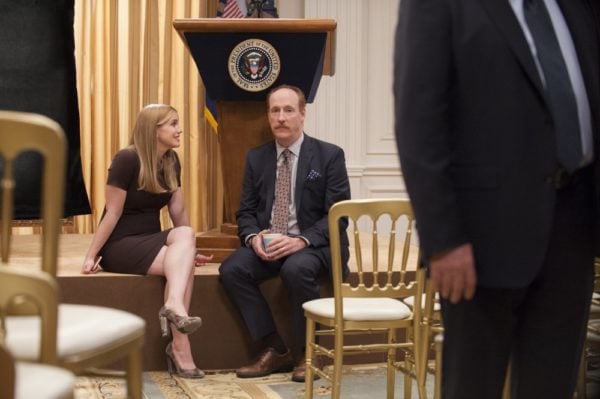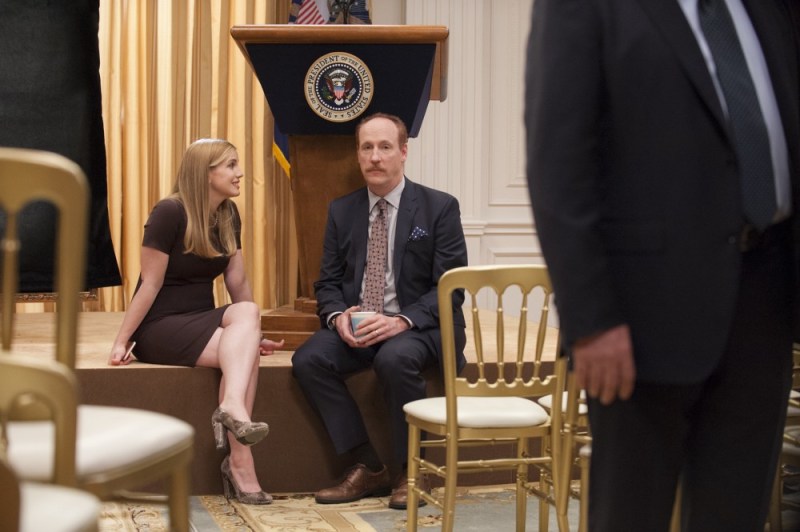
Now in its sixth season, HBO’s popular and critically-acclaimed political satire ‘Veep’ follows the lives of now-former president Selina Meyer (Julia Louis-Dreyfus) and her staffers as she navigates her post-presidency life. On ‘Veep’, Matt Walsh plays Mike McLintock, one of Selina’s loyal staffers and former White House Press Secretary. A legend within the comedy community, Matt Walsh is also a co-founder — alongside Amy Poehler, Matt Besser and Ian Roberts — of the Upright Citizens Brigade (UCB), one of the nation’s most well-known improv groups. The Stanford Daily talked with him about the show’s narrative, his improv-comedy background and feeling like a quintessential New Yorker.
The Stanford Daily (TSD): Since ‘Veep’ is clearly a political satire, how did the election influence the season six story?
Matt Walsh (MW): That’s the question everyone asks. I think when the election happened, we took an extra week for the writers to figure out how it was going to change, and ultimately, they kept the storyline intact because Selina isn’t president, and it’s fortunate that we’re not compared, with direct comparisons, to the current president. That’s a blessing. I think some of the jokes might have been changed because of news items that would have made our jokes change. I think we’ve altered a few jokes here and there, but ultimately the story remained intact.
TSD: You’ve previously talked a lot about using improv to develop your character, Mike, and I’m wondering how that plays out in the new season. Does your improv background help or play into that at all?
MW: I think I get to use my improv chops in rehearsal. That’s where we usually play with the script. It’s usually the scenes that are worth working — it’s not the whole script. We’ll have a table read and then we’ll turn the kitchen in our offices into a limousine, because we don’t have access to the stages every day. We’ll then improvise and try to figure out what’s not working. I love those rehearsals because they really help make those scenes better. When we’re actually filming, if we’re lucky enough to get a free space, then I feel like I can play with the material and try things. But it’s a very busy schedule, so we don’t always get that free space.
TSD: Now that ‘Veep’ has been renewed for season seven, where do you see the future of the show going?
MW: I have no idea. What I love about our show is that they really rip up the premise. They made Selina the president on a show called ‘Veep.’ They love to punish Selina. They had an electoral college tie. This season, she’s not president anymore. Next season, she could be in the UN, or in space.
TSD: I’ve noticed that Selina, as a character, has become more crass as the seasons go on. Do you agree with that? If so, why do you think that is? Why do you think the character has changed?
MW: Well, my mom says the show has gotten more filthy — but that’s her perspective [laughs]. The show has been shaped by the insults and the way we treat each other, and there’s really eloquent insults that Armando Iannucci, our first showrunner, put in the DNA in the show.
TSD: Where did that impulse originate for Armando?
MW: This was Armando’s first observation when he toured DC while making the pilot. The way people talked when they’re not on camera, or not in the Senate, or not in an official meeting — everybody has this filthy, foul mouth. The people are very colorful, so I think that was one of the things he wanted to satirize, or at least make sure was written into the scenes. He also loved how everyone had terrible offices, with three people to a desk. He picked up the crassness right away.
TSD: What do you find most rewarding about comedy, whether it be improv, sketch, television, or anything in between?
MW: I guess I love the power of making people laugh. It’s very rewarding to be onstage and write something that can get this huge response from people. And personally, it’s just a lot of fun. I don’t know. I can’t say it any other way. Comedy is just so much more fun than drama — it’s definitely difficult to do, but comedy is just so much more rewarding with an audience.
TSD: Were there any influential experiences that come to mind when you think about your path through comedy?
MW: Well, I’m one of seven kids, and I loved seeing my parents laugh. Also, my dad used to tell really terrible jokes, but he’d laugh. There’s something about wanting to get attention, being the middle child of seven.
TSD: Coming from a student’s perspective, what advice do you have for students who want to get involved with comedy and the like going forward, especially in terms of cultivating skills with like-minded people?
MW: Great question. First of all, take a class at UCB [laughs]. Secondly, I think comedy, improv, and sketch are all life experiences, so I think you have to read a lot of books, stay dialed into pop culture. You have to travel. Ultimately, you have to develop very keen listening habits; unless you’re doing stand-up, most comedy involves a scene partner. That’s where great comedians show themselves. They’re really going to listen and use what their partner is giving them.
TSD: As a co-founder of UCB, one of the nation’s premiere comedy troupes, what was a favorite memory from that time?
MW: When we first came to New York, we were just nobodies from Chicago. We just did a really good show in the West Village at the place called the Duplex, I think, and we all went outside on the street, sat on the street, had a cigarette. We were sitting there when freaking Lou Reed walked by in front of us. It was such a quintessential New York moment. We just did a hit show, we just did a great show, we were kids from Chicago, hanging outside on a stoop, which is a very New York thing to do, and then Lou Reed walks by. It was amazing.
TSD: Did you get to talk to him?
MW: No, no, we didn’t want to bother him [laughs].
Season six of ‘Veep’ can be watched on Sundays at 10:30 pm PST on HBO.
Contact Olivia Popp at opopp ‘at’ stanford.edu.
